|
|
|
Sort Order |
|
|
|
Items / Page
|
|
|
|
|
|
|
| Srl | Item |
| 1 |
ID:
163648
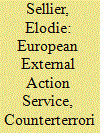

|
|
|
|
|
| Summary/Abstract |
The European External Action Service (EEAS), specifically mandated with enhancing coherence between the Common Foreign and Security Policy (CFSP) and non-CFSP bodies on the one hand, and the European Union and member states on the other hand, has the potential to increase CFSP’s contribution to the fight against terrorism and diminish the boundaries between CFSP and other policies. Several of the EEAS’ cooperation and coordination duties, as well as the inclusive composition of the Service, allow for a more coherent approach to counterterrorism policymaking. In practice, coherence is unfolding in diplomatic cooperation with third countries and Common Security and Defence Policy (CSDP) missions, as CFSP and Justice and Home Affairs actors seem to build on one another’s strengths. The picture is more nuanced in the area of intelligence, where the activities of the EU intelligence centre, transferred from the Council of the European Union to the EEAS, are conditional upon member states’ willingness to exchange information. Ultimately, current efforts towards coherence remain subject to a somewhat paradoxical two-speed process: one that encourages the meshing together of institutional actors and policy cultures, while deferring access to justice to national law, thereby yielding a system of protection of individuals à géométrie variable.
|
|
|
|
|
|
|
|
|
|
|
|
|
|
|
|
| 2 |
ID:
163646
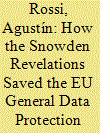

|
|
|
|
|
| Summary/Abstract |
Snowden’s global surveillance revelations inverted the direction of the European Parliament’s debate on the General Data Protection Regulation (GDPR). Before Snowden’s revelations, corporations were shaping Europe’s privacy rules. But when Snowden’s revelations raised the salience of Internet privacy issues, the power of corporations went down, and privacy advocates incorporated their preferences into the GDPR. Thus, the fact that Snowden was able to increase the salience of privacy issues was instrumental in defeating organised corporate power and enabling privacy advocates to mobilise Europe’s culture of privacy protection.
|
|
|
|
|
|
|
|
|
|
|
|
|
|
|
|
| 3 |
ID:
163641
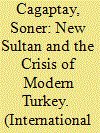

|
|
|
|
|
| Summary/Abstract |
Turkey’s deep societal polarisation is a direct result of Recep Tayyip Erdogan’s political trajectory. Prime minister of Turkey since 2003 and president since 2014, Erdogan has become the most unassailable Turkish leader since Mustafa Kemal Ataturk established modern Turkey in 1923 out of the ashes of the Ottoman Empire. A prototype of populist leaders globally, Erdogan has demonised and brutalised demographics that are not likely to vote for him, including leftists and liberals. Erdogan’s populism has helped him built a loyal base composed mostly of conservatives, many of whom he has lifted out of poverty. Accordingly, Turkey is split nearly in the middle: half the country adores him, while the other half loathes him. But, Erdogan wants to shape all of Turkey, including those that loathe him, in his own image, using his power to funnel state resources towards top-down social engineering. To this end, he has decided to push ahead, declaring himself omnipotent president. Half of Turkey though will never embrace Erdogan’s agenda and this will exacerbate Turkey’s deep political crisis.
|
|
|
|
|
|
|
|
|
|
|
|
|
|
|
|
| 4 |
ID:
163644
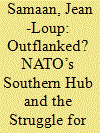

|
|
|
|
|
| Summary/Abstract |
Following the rise of the Islamic State in 2014, the Atlantic Alliance engaged in an ambitious political revision of its policies towards the Middle East, which led to the creation of the NATO Strategic Direction South Hub. However, this new policy was only marginally the product of a threat-driven strategy; rather it was the result of two factors. Specifically, it responded to a political need in NATO Headquarters and the capitals of member states, particularly in Southern Europe countries, to acknowledge the latest security challenges in the Middle East and to offer a policy more balanced between NATO missions to the East, namely vis-à-vis Russia’s policies in its neighbourhood, and those in the South. The Hub also provided the Joint Forces Command – Naples with a strong mission within the NATO bureaucracy. Nevertheless, the limitations of the project with respect to the Alliance’s other political priorities indicate that this institutionalisation of a new organisation within NATO did not overcome the ambiguities of the Alliance’s posture towards the region, but rather reflected them.
|
|
|
|
|
|
|
|
|
|
|
|
|
|
|
|
| 5 |
ID:
163643
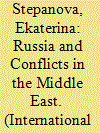

|
|
|
|
|
| Summary/Abstract |
While Russia’s Syria campaign initially was meant largely as a trump card in its troubled relations with the West, it also upgraded Russia’s standing in the region, which stimulated its growing interest in regional partnerships and in the Middle East per se. However, Russia’s relative success in gaining influence in the Middle East is due not only to its involvement in Syria, but also to its ability to grasp and adjust to the growing role of regional processes and dynamics and its readiness to play with key regional powers as an equal. This ability developed gradually, reflecting and building upon Russia’s practice of reaching out to multiple partners, as well as its non-ideological approach, pragmatism and cultural relativism. The West’s real problem in the region is not with Russia, but with accepting and adapting to the main regional trend today – the regionalisation of politics and security in the Middle East.
|
|
|
|
|
|
|
|
|
|
|
|
|
|
|
|
| 6 |
ID:
163645


|
|
|
|
|
| Summary/Abstract |
Ever since the 1980s, the MENA subsystem has been weakening under the weight of persistent inter-state conflict, violent non-state and sub-state actor incursions, and intense competition for influence and geopolitical advantage amongst its core states. Furthermore, a domino-like collapse of autocratic regimes across the Arab region after 2010 heralded an unprecedented level of disorder, insecurity and chaos. Regional disorder and the general crisis of the state in the Arab region has aggravated regional fragmentation and has at the same time emboldened Saudi Arabia and a small group of its neighbours to adopt a more interventionist, and at times belligerent foreign policy posture. The region’s changing dynamics provide the backdrop for closer analysis of Saudi responses to the regional crisis, which itself has been shaped by the changing of the guard in the Kingdom in 2015. The change is marked by an intensification of Saudi activism and a deepening of its role as a resurgent regional power.
|
|
|
|
|
|
|
|
|
|
|
|
|
|
|
|
| 7 |
ID:
163642


|
|
|
|
|
| Summary/Abstract |
Turkey’s response to the Kurdistan Regional Government of Iraq’s independence referendum took most observers by surprise. The prevailing assumption was that, despite its vocal objections, Turkey would eventually just accommodate the results of the referendum because years of engagement and a KRG-centred Iraq policy had created multi-faceted interdependencies, which would be hard to overturn. However, rhetoric dictated policy. In a counter-intuitive move, Turkey realigned its partnerships to chart a new policy which involved greater coordination with the central government of Iraq. This reaction is best understood through a study of contextual variables at regional, domestic and leadership levels which have led to major changes in Turkey’s regional policies.
|
|
|
|
|
|
|
|
|
|
|
|
|
|
|
|
| 8 |
ID:
163647
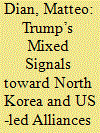

|
|
|
|
|
| Summary/Abstract |
The relationship between the Trump administration and the regime in Pyongyang has gone through two distinct phases: a period of crisis and confrontation, roughly corresponding to the year 2017, and a period of diplomacy and détente in the first half of 2018, which culminated in the Singapore summit of June 2018. During both phases, Trump’s approach has been characterised by a high degree of unpredictability and the use of ‘mixed signals’. As a consequence, while the US achieved a significant objective in 2018, namely a reduction in tension and risk of conflict, this came at a considerable cost, especially in terms of the solidity of the US-led alliances in East Asia.
|
|
|
|
|
|
|
|
|
|
|
|
|
|
|
|
|
|
|
|
|